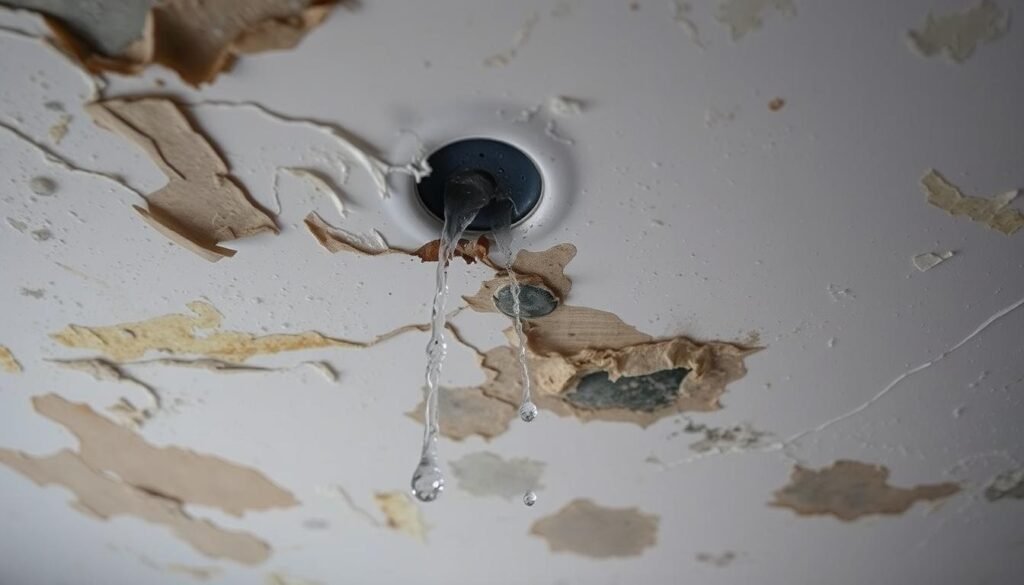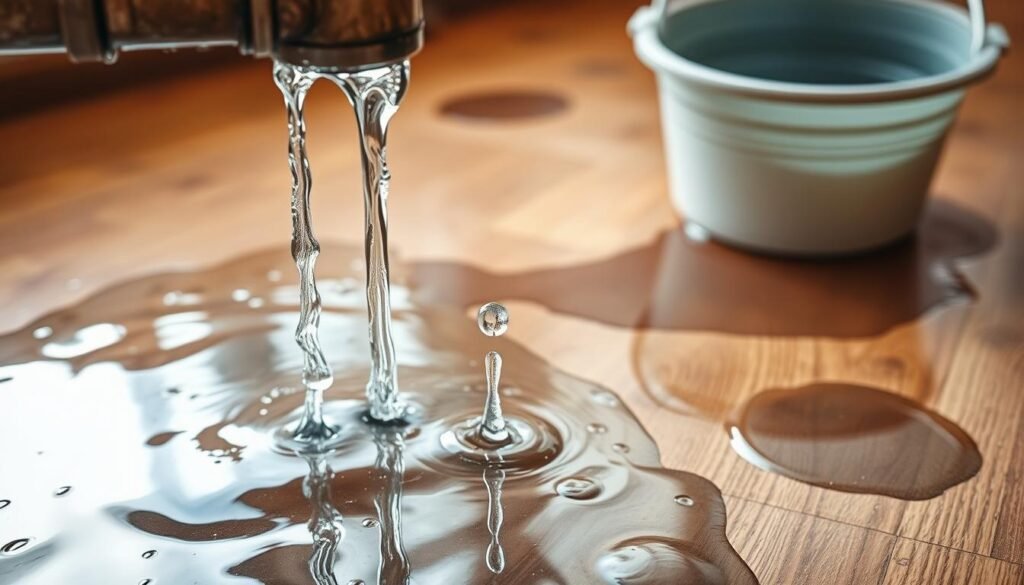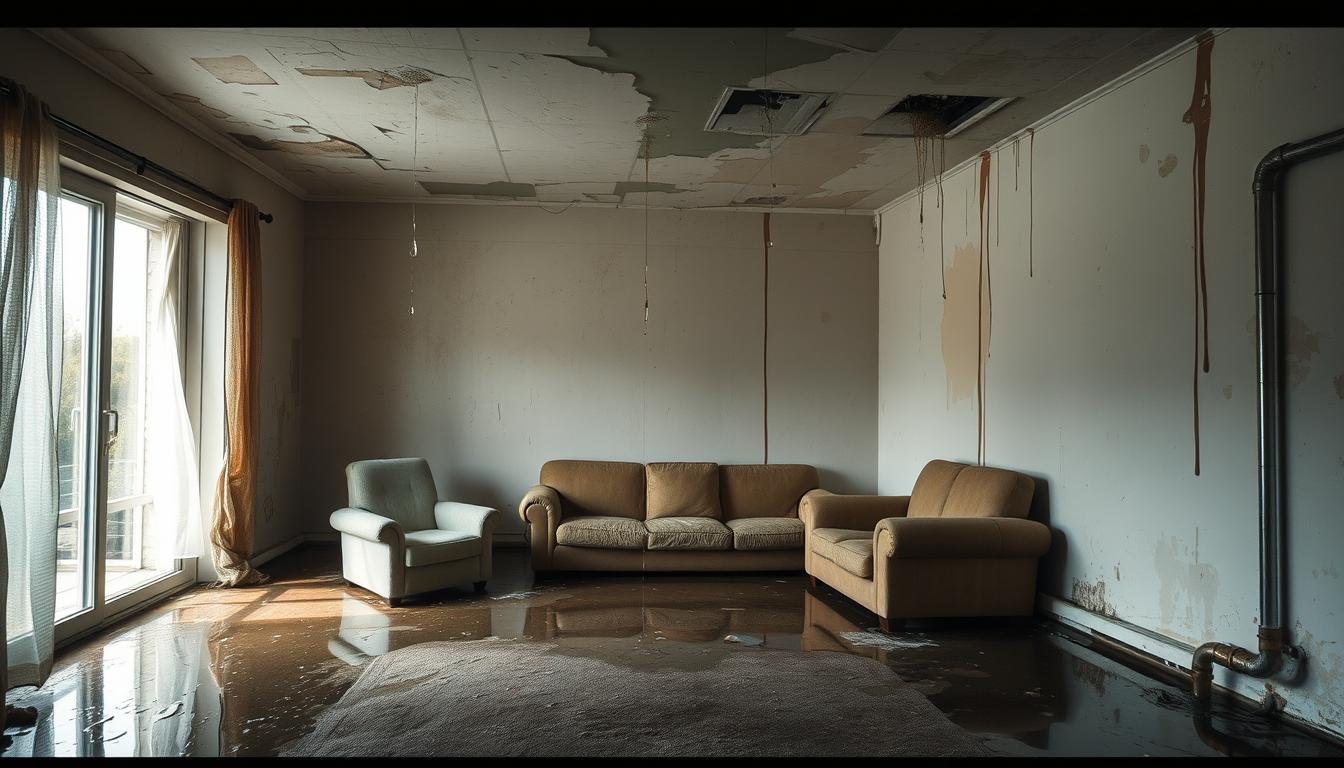Water leaks in your home can be a big stress, especially when you need to file an insurance claim. Many homeowners wonder: Does my homeowner’s insurance cover plumbing-related water leaks, and if so, how do I ensure a successful claim? This article will help you through the process of making a successful water leak insurance claim, focusing on plumbing-related issues.
You’ll learn how to figure out if your homeowner’s insurance covers plumbing-related water leaks. You’ll also learn the step-by-step process for filing a successful claim. Plus, you’ll get tips to increase your claim’s success rate and avoid common mistakes. By the end, you’ll know how to confidently navigate the claims process.
Key Takeaways
- Most standard homeowner’s insurance policies cover sudden and accidental water damage, including damage from burst pipes.
- Prompt action and thorough documentation are essential for a successful insurance claim.
- Gradual damage, such as from a slow leak, is typically excluded from coverage.
- Hiring professional water damage restoration services can improve the outcome of your claim.
- Preventative measures like regular inspections and smart home devices can help avoid future water leaks.
Understanding Your Policy Coverage
Understanding your homeowner’s insurance policy can be tough, especially about water damage coverage. It’s key to check your policy before a water leak happens. This way, you’re ready to file a claim successfully.
Covered and Non-Covered Scenarios
Most policies cover sudden water damage, like a burst pipe. But, they don’t cover gradual damage or maintenance issues. It’s important to know what your policy includes and excludes.
Reviewing Policy Details with Your Insurance Agent
It’s wise to talk to your insurance agent about your policy. They can explain what’s covered, what’s not, and if you have extra coverage. This helps you understand your policy better and handle claims easier.
Water damage claims happen often, affecting about one in every 60 homes each year. In 2020, 6% of homes filed a claim, with water damage being a big reason. Knowing your policy well can help you deal with water leak claims better.
“Homeowners insurance policies generally cover sudden or unexpected water damage, such as storm-related discharge of water or accidental backups or overflow. However, they typically do not cover gradual water damage or wear and tear, such as slow leaks, rot, mildew, corrosion, or long-standing problems.”
Immediate Steps After Discovering a Leak
When a water leak hits your home, acting fast is key. First, try to stop the water source if you can. Find the main water shutoff valve and turn it off. Then, figure out where the leak is coming from and call a plumber to fix it.
After stopping the water, document the water damage. Take clear photos and videos of the damage. Note the date, time, and what happened. Keep all repair receipts and professional assessments. This evidence will help your insurance claim.
Hire Professional Assistance and Obtain Detailed Reports
It might be smart to hire a water damage specialist for a full check. They can spot mold or structural problems. A detailed report from them will show the full damage, making your claim stronger.
| Statistic | Value |
|---|---|
| Escape of water incidents account for 29% of all domestic claims in the UK | 29% |
| Insurers pay out an average of £1.8 million daily for damages caused by water leak claims | £1.8 million |
| 23% of all water damage home insurance claims in flats since 2018 were caused by leaks from neighbours’ properties | 23% |
| The financial impact of water leaking into or from neighbouring properties is estimated at £2.8 million per year | £2.8 million |
By acting quickly and documenting the damage, you’re on the right path to a successful insurance claim. The more evidence you have, the stronger your case will be.

Filing Your Water Leak Insurance Claim
When you have a water leak, filing an insurance claim is the next step. The process might differ slightly with each insurance company. You’ll need your policy number, detailed damage documentation (like photos and videos), and a list of damaged items with their values and when you bought them.
When starting your claim, be ready to give a lot of information about the damage. Your insurance will send an adjuster to check the damage and review your documents. Make sure you’re there for the inspection and ask about what comes next.
- Gather your policy number and have it ready.
- Document the damage well with photos, videos, and reports.
- Make a detailed list of damaged items, including their value and when you bought them.
- Talk openly with your insurance provider about the damage and what you’ve done so far.
- Set up a time for the adjuster’s visit and be there to answer questions.
- Ask the adjuster about the claim’s next steps and timeline.
By following these steps and providing the right documentation for insurance claim, you can help your claim go smoothly. Keeping in touch with your insurance provider is key for a good outcome.
The adjuster’s visit is a key part of the filing water leak insurance claim process. Their review of your documentation for insurance claim and the damage’s extent will affect your payout. Being proactive and working well with your insurance and contractors can help you through this.
Strategies for Maximizing Your Claim Success
Getting a good outcome from your water leak insurance claim is more than just sending in papers. Being proactive and persistent, using simple and clear language, leveraging professional assessments, and understanding why claims are denied or undervalued can really help. Also, gathering more evidence can make a big difference in your claim’s success.
Being Proactive and Leveraging Professional Assessments
It’s important to tell your insurance company about the water damage right away. Waiting too long can hurt your chances of getting your claim approved. Keep a detailed record of all talks with your insurer, including estimates, receipts, and contractor agreements.
Getting estimates from different contractors can help you understand the repair costs better. This can also help you negotiate a fair settlement.
Considering a Public Adjuster
If your claim is denied or undervalued, think about getting a public adjuster to help you. Public adjusters are experts who work for you to negotiate with the insurance company. They can often get you a better settlement, but they do charge a fee.
Being proactive, paying attention to details, and getting professional help when needed are key to maximizing water damage insurance claims. These steps can help speed up the recovery process.
| Strategy | Benefits |
|---|---|
| Prompt Reporting | Increases chances of claim approval |
| Detailed Record-keeping | Aids in negotiating fair settlements |
| Multiple Repair Estimates | Provides comprehensive understanding of repair costs |
| Hiring a Public Adjuster | Expertise in advocating for policyholders and negotiating higher settlements |

“Engaging with experts who understand the insurance industry can streamline the claims process and lead to an exceptional end-result.”
Preventative Measures and Smart Home Technology
Protecting your home from water leaks is easier than you think. By being proactive, you can lower the risk of water damage. Start by checking your plumbing regularly to catch small problems before they get big.
If your home has old or corroded pipes, it’s time to replace them. Modern materials are less likely to leak. Also, keep an eye on your water pressure. High pressure can damage pipes and cause leaks.
Smart home devices, like leak detection sensors, can help find leaks early. They might even get you insurance discounts.
- Proactive plumbing maintenance to catch issues early
- Replacing old or corroded pipes with modern materials
- Monitoring water pressure to prevent strain on pipes
- Installing smart home leak detection systems for early warning
- Exploring insurance discounts for smart home devices
By taking these steps, you protect your home and show you’re serious about reducing risk. This can improve your insurance relationship. Stay proactive to be ready for any water-related issues.
“Flo Smart Water Monitor and Shutoff devices can cut water damage claim frequency by up to 96% and prevent household water wastage by up to 90%.”
Smart home water protection systems can greatly reduce water damage and insurance claims. They save money and give you peace of mind. Your home will be better protected.
How to make a successful water leak insurance claim
Dealing with water leak insurance claims can be tough. But, with the right steps, you can get the help you need. Here’s how to do it right:
- Understand Your Policy Coverage – Read your insurance policy well. Know what water damage it covers. Look out for any parts that don’t apply.
- Act Quickly After Discovering a Leak – Stop the leak right away. Take photos of the damage. This shows how urgent it is.
- Hire Professional Assistance – Get plumbers, restoration experts, and adjusters if needed. Their reports can really help your claim.
- File the Claim Promptly – Tell your insurance about the leak fast. Give them all the proof you have.
- Implement Preventive Measures – Think about smart home tech and regular checks. They can help avoid future leaks and help with claims later.
By following these steps and getting help from experts, you can handle your claim well. Paying attention to details and being proactive are crucial for a good outcome.
| Claim Statistic | Percentage |
|---|---|
| Water damage insurance claims are the most commonly filed losses after hail and wind damage | – |
| Approximately 1 in every 60 homeowners file a property damage claim due to water damage and freezing annually | – |
| Water damage is considered the second most common type of home insurance claim | – |
Knowing why claims get denied, like for negligence, helps. Taking steps to prevent and document damage can help your claim. Remember, getting help and being detailed are key.
“Keeping records of professional inspections on plumbing or appliances can help support claims against gradual damage.”
Don’t let a water leak surprise you. Follow these steps and get expert advice. This way, you can make a strong insurance claim and protect your home and money.

Common Pitfalls and How to Avoid Them
Filing a water leak insurance claim might seem easy, but homeowners often face common issues. These can hurt your claim’s success. Knowing why claims get denied and how to gather more evidence is key to a strong claim.
Understanding Reasons for Denial and Gathering Additional Evidence
One big reason for denial is not having enough documents. Insurance needs detailed reports, receipts, and photos to see the damage and repairs needed. Without this, your claim might be denied or not valued right.
Another reason is if the damage was from something already wrong or not maintained well. Getting a professional’s opinion can show the damage was sudden and not because of neglect.
If your claim is denied or you think the offer is too low, appeal it. More evidence, like a second opinion from a public adjuster, can make your case stronger. This could lead to a better outcome.
| Common Reasons for Claim Denial | Tips to Strengthen Your Claim |
|---|---|
| Lack of documentation | Provide detailed reports, receipts, and photographic evidence |
| Damage caused by pre-existing conditions or lack of maintenance | Obtain a professional assessment to demonstrate sudden and accidental damage |
| Damages exceeding policy limits | Review your policy coverage and consider increasing limits if necessary |
Being proactive and gathering the right evidence can help your claim succeed. Avoiding common pitfalls can prevent denial or undervaluation of your claim.
Conclusion
To successfully make a water leak insurance claim, you need to know your policy well. Act fast when you find a leak. Document the damage thoroughly and talk clearly with your insurance company. Using smart strategies can help your claim succeed.
Water damage claims are common, and your policy might cover sudden leaks. But, know what’s not covered, like flooding or sewage backups. Reporting the leak quickly, documenting the damage, and getting professional help can boost your claim’s success.
It’s also key to understand your policy’s limits and deductibles. Knowing how to negotiate with your adjuster can help you get fair compensation. If the first offer isn’t good, consider getting help from a public adjuster or insurance claim lawyer. Being proactive and organized can help you through the process, protecting your home and wallet.
FAQ
What is covered under homeowner’s insurance for water leaks?
Homeowner’s insurance usually covers sudden water damage, like a burst pipe. But, it doesn’t cover slow damage, maintenance problems, or flood damage.
How do I properly document a water leak for my insurance claim?
First, stop the water leak. Then, take clear photos and videos of the damage. Keep records of any emergency fixes and professional checks. Getting a water damage expert to look at the damage can help your claim.
What is the process for filing a water leak insurance claim?
Start by having your policy number ready. Then, document the damage well. List damaged items with their value and when you bought them. Your insurance will send someone to check the damage and look at your documents.
How can I maximize the success of my water leak insurance claim?
Be quick and clear in your communication. Use expert opinions to support your claim. Know why your claim might be denied or undervalued. Collect more evidence to help your case. A public adjuster can also help.
What preventative measures can I take to reduce the risk of future water leaks?
Get your plumbing checked regularly. Think about replacing old pipes. Watch your water pressure. Use smart devices like leak sensors. These steps can protect your home and help with insurance.
What are some common pitfalls to avoid when making a water leak insurance claim?
Know why your claim might be denied, like missing documents or ignoring maintenance. If your claim is denied or low, get more evidence. A second opinion from a pro can help your appeal.
